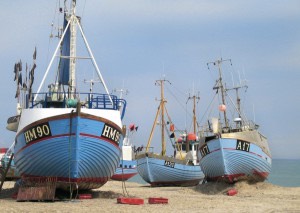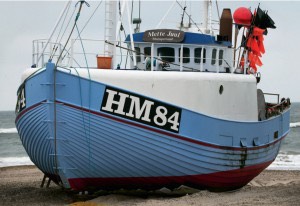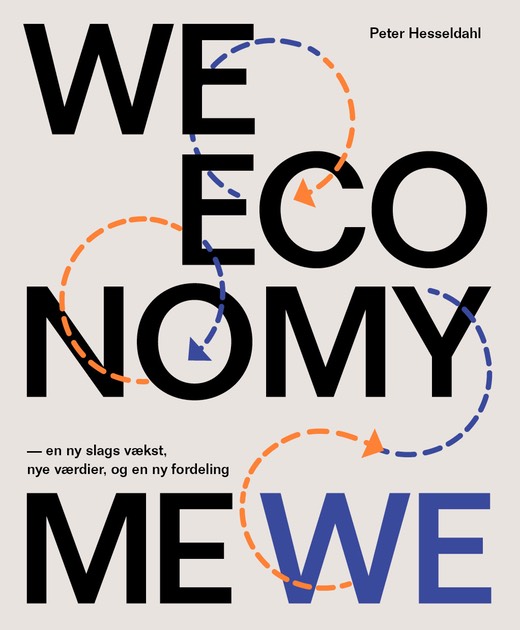Fishing is traditionally an extremely competitive industry. However, the fishermen of a small Danish community realized, that unless they formed a guild and started cooperating they would all be out-competed by even larger boats.


Fotos: Thomas Højrup
The fishing industry has seen a dramatic consolidation in recent decades. Larger boats and better technology has meant that smaller, independently owned fishing boats have gone out of business. This trend was strengthened in 2006 when the current system of transferrable quotas of fishing rights was installed.
The quotas were assigned by the state to the owners of fishing boats based on their catch in the previous years. The boat owners were allowed to sell the quota if they didn?t want to use it themselves.
Because fishing rights are in tight supply, the quotas became valuable assets and subject to speculation and bidding wars. It became very tempting for small boat owners to scrap their old boat and sell the quota to highest bidder.
At the same time, it became very hard for new fishers to start up, because the entry price was so high.
Traditionally, the income from a catch was divided among those working on the boat, after paying for the expenses. When quotas were issued to the owner of the boat, this created a new, less equal situation. Because the boat owner is the only one with the right to catch fish, the others then become employees, receiving a salary rather than being entitled to a share of the catch.
The effect of the quota system was to strengthen large companies, which had the capital to buy up quotas and modern ships that could catch larger volumes. Today, just 10 large shipping companies hold the majority of Danish quotas.
Correspondingly, the system led to a rapid decline in the number of small independent boats ? and with them, the decline of the fishing village and communities that depended on them.
COOPERATION TO SAVE THE COMMUNITY
Within a month of the introduction of transferable quotas, all fishing boats in the small village of Lildstrand were abandoned. In the neighboring village of Thorupstrand, the fishers realized that unless they acted in solidarity, the same would happen to their community. Their solution was to create a guild that cooperatively bought up and owned the fishing quotas. The guild was set up to ensure that all the members have the possibility of having the size of quota they need ? while avoiding that they bid up the prices against each other.
It?s not necessary to own a boat in order to be a member of the guild. This means that fishers without a boat ? typically young fishers ? can get fishing rights, and in that way work for their own share of the catch.
The guild consists of 20 members working on 12 boats. Each member pays a deposit of 20.000 euros, and if they choose to leave, they can only have this amount back. This discourages members leaving to cash out value from the guild.
Every season each fisher declares how much he intends to fish, and if necessary, the guild buys additional quotas. Members pay a fee for using the quota, which the guild uses to service the bank loans, which it has taken to buy up quotas. The size of the fee depends on how much fishing rights each fisher reserves.
This set up offers a number of advantages:
- By buying quotas collectively there are no bidding wars among the fishers within the guild
- Banks will provide loans at lower interest rates and more favorable condition, because they have collateral in the quotas for the entire guild.
- It lowers the financial barrier of entry for young starting fishers.
OTHER OBJECTIVES THAN JUST PROFITS
One could argue, that these are exactly the same advantages that an investor would have by operating a large shipping company, with many boats, a large pool of quotas and a workforce of employed fishers.
Thomas Højrup, a professor in Ethnography at the University of Copenhagen, has studied the guild closely since it was founded.
In his opinion there is a major difference in the way a regular commercial company and the way a guild operates. They have different purposes, and the experience and outcome for those who work there are very different. In fact, he points out, the cooperative is a reaction against the trends towards larger companies.
Thomas Højrup argues that there would not be such strong motivation and cooperation among the fishers if they were merely employees. The value that they build belongs to them selves, so they will put more effort into it ? making them better able to compete with larger companies.
Furthermore, the fishers are not just trying to earn a wage. They are trying to maintain a way of living that they enjoy, and they are working to keep their entire local community and culture alive. In a sense, the guild represents a whole village taking ownership of its future development.
Finally, fishing near the shore in small boats has a different impact on the environment. A commercially driven company will tend to maximize volume and save money by using the most efficient way of fishing, which is trawling. However, using trawl damages the seabed, and requires much more fuel. Trawling tends to damage the fish, as well. In contrast, 95% of the catch from Thorupstrand is currently exported as the so-called E-standard fish ? of extraordinary high quality.
In january 2015 the guild started a partnership with COOP, the cooperatively owned chain of Danish supermarkets to create a unique brand of fish, produced with the low environmental impact and supported by the story of the committed local community of cooperative fisher men.
